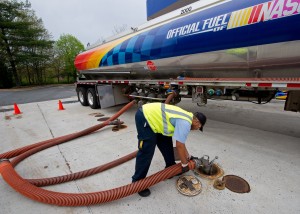Philadelphia's Sunoco Refinery Will Process Shale Oil With the Help of Natural Gas
The Sunoco refinery in southwest Philadelphia, scheduled to shut down in August, will now be used to refine domestic oil from North Dakota’s Bakken Shale. The plan also calls for the use of natural gas to power a hydrocracker, which is used to turn crude oil into usable products such as gasoline.
The plan was announced by a host of city, state and federal officials, including Philadelphia Mayor Michael Nutter, Congressman Bob Brady and Governor Tom Corbett. The deal between Sunoco and the private equity firm The Carlyle Group will form a joint venture called Philadelphia Energy Solutions.
The refinery currently processes 330,000 barrels of oil a day. Federal energy officials worried that the planned shut down would create a shortage of gasoline in the East Coast region. The Carlyle Group says the deal will save 850 jobs and create 100 to 200 permanent positions, as well as construction jobs.
Carlyle Managing Director Rodney Cohen says the company will also be looking at projects related to processing Marcellus Shale gas.
“In addition, the refinery’s exceptional location and infrastructure will enable the joint venture to create new business opportunities related to Marcellus Shale natural gas fields,” said Cohen.
“We also look forward to continuing to work with all of the relevant stakeholders – government officials, the community, environmental officials and organized labor – as we work to stabilize, strengthen and expand the refinery.”
The joint venture will also include an upgraded cracker, and a high speed rail line to transfer the oil from North Dakota.
Sunoco has already shut down a refinery in Marcus Hook, Delaware County. A recent report issued by IHS Global encouraged officials to convert that plant into a Marcellus Shale gas processing hub.
“We also look forward to continuing to work with all of the relevant stakeholders – government officials, the community, environmental officials and organized labor – as we work to stabilize, strengthen and expand the refinery.”
The joint venture will also include an upgraded cracker, and a high speed rail line to transfer the oil from North Dakota.
Sunoco has already shut down a refinery in Marcus Hook, Delaware County. A recent report issued by IHS Global encouraged officials to convert that plant into a Marcellus Shale gas processing hub.

















